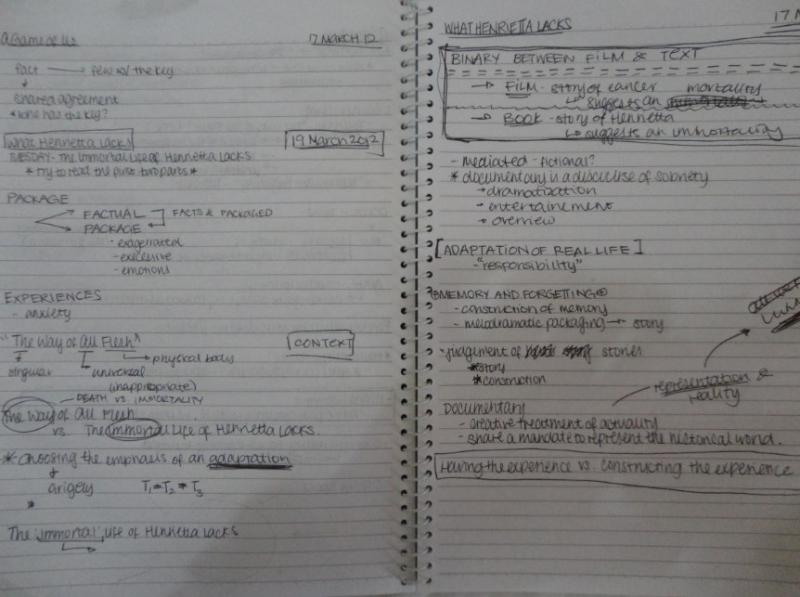Serendip is an independent site partnering with faculty at multiple colleges and universities around the world. Happy exploring!
Recreating Memories + Stories

I'm just going to post this before I lose this train of thought. I'm really interested in what we talked about in class today about the construction of all of our memories. This made me think of how we constantly mediate everything that surrounds us. I'm going to ground my thoughts in examples and what I'm looking at are class notes:

This is an image of my class notes from today. (Admittedly, they are not as comprehensive as my notes usually because I'm running on four hours of sleep.) If I wanted to tell someone what happened today in class, I could look at these class notes to prompt me. However, reconstructing from this data would be different from the "actual" discussion that we had today because I mediated the points that intrigued me personally. I also included other things that helped me understand the discussion. For example, I have references to other theorists that helped me think through the thoughts in my head. Therefore, if I were to reconstruct the "reality" that happened today, it would be near impossible to "tell the full story".
But does this really matter? I have the "gist" of the class discussion and I took out of it the things that I wanted to. While other people in the class might want to highlight other things, what I've included is relevant to me. I acknowledge that other people's opinions might differ but at the end of the day, I'm going to take just a couple of strands of conversation with me. Does it really matter if my reconstruction of class today is not completely the "truth"?



Comments
To me, your reconstruction of
To me, your reconstruction of our conversation is completely true. Our conversation from Thursday’s class does not exist anymore (well, maybe it does). The only incarnation of it is in your memory, and in my memory, and in everyone else’s memory. When you construct our conversation, it’s as if it’s happening for the first time. So, our constructions and our stories are our experiences. They are the truth! Facts!
I understand that this line of thinking is problematic. If everybody gets to have their own truths, and they’re true, then there’s very little space for collective revision. A friend calls this “relativist bullshit.” She’s right. But the opposite, the idea that some constructions and stories are correct, is equally disturbing (for example, Rick Santorum’s rhetoric). There has to be some kind of middle ground between relativism, which lets everyone turn memories into anything they want to, and absolutism, which says some memories are right and others' are wrong. I think the final story in the memory and forgetting podcast explained this middle ground for the physical world. Our feelings are relativistic truths, but our actions and words have to coalesce around some semblance absolutism. You can feel however you want to about our class, but you can’t say that we talked about the price of tea in China because, well, we didn’t.
I need help conceiving this middle ground in the world of narrative. Like Anne, I often know (feel?) that “some stories are better than other stories.” I make alarming value judgements based on this knowledge. Some examples: Darwin > God; Ira Glass > Rush Limbaugh; The Immortal Life of Henrietta Lacks > The Way of All Flesh. Why do I do this/everybody does this, right? The only answers I can come up with have to do with my feelings and my parents. These are relative things...I’m sure there are lots of people who would switch the direction of all my greater than signs. So, does this mean that narratives are forever stuck in a relativistic world? Does this mean that narrative is bullshit? AHHHHHHH! I hope not! I like stories! I need stories! Is there any absolutism in the word of narrative? What are the rules? If there aren't any then why are we telling stories?